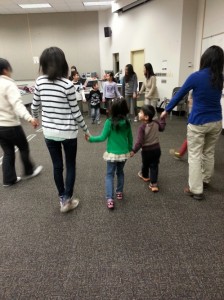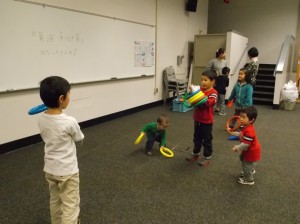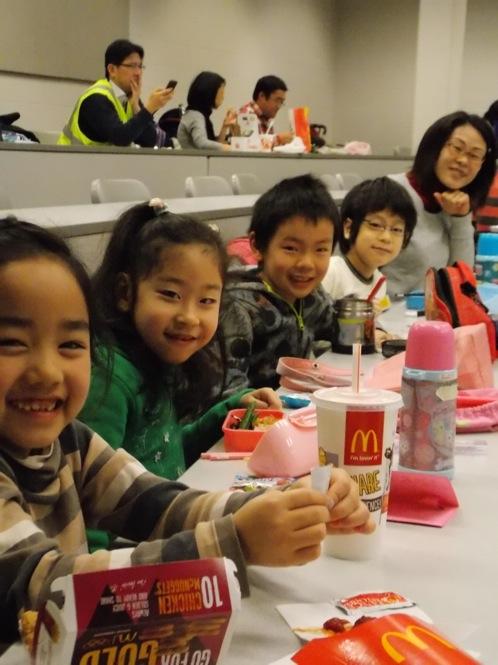Japanese children use IUS to stay ahead
Japanese Saturday School is a school for Japanese children from kindergarten through middle school, or ninth grade. The program has been affiliated with IU Southeast since 1988.
March 3, 2014
Fifth grader, Seina Kamimura wants to be an astronaut. She knows everything about space and has space encyclopedias. She said she even knows more than her American teacher. Math is her strong suit because Kamimura spends her Saturdays at Japanese Saturday School, where she said the math is harder than her American school.
Japanese Saturday School is a school for Japanese children from kindergarten through middle school, or ninth grade. The program has been affiliated with IU Southeast since 1988 when Japanese companies in the area started sending more people to the U.S. to work. The program uses Hillside Hall as their meeting place.
Usually the assignments and trips to the U.S. would only last three- to- four years, enough time for children in these families to be far behind in their schooling.
Shinichi Kimura, volunteer principal at the Japanese School, said because three- to- four years is not a long stay there is an issue with the education of the children.
“After three- to – four years they will go back to Japan, and of course they don’t want to be delayed when they go back to Japan,” Kimura said.
The popular belief in Japanese culture is that a good college equals a big company, and since Japan is much smaller than the U.S. there is more competition in schools, Kimura said.
Mieko Shimomura, PTA chairperson, said high school is not required in Japan, but most people attend unless they go to a vocational school.
“Some students start studying for entrance exams in elementary school,” Shimomura said.
There are entrance exams to get into all of the middle schools, high schools and colleges. Students spend much of their time studying because they want to pass exams and be able to attend a good school, Shimomura said.
“It’s not like in America,” Kimura said. “In Japan when you get a job you pretty much stay there until you retire. Big companies mean a steady income.”
To be hired at a big company it is important to graduate from a good college, so the entrance exams are very important. That is why Saturday school exists.
“The purpose of this school is so children will gather together once a week and learn normal Japanese education,” Kimura said.
Shimomura said Saturday school is very homework heavy because there is only one meeting a week, but just like American schools they learn math, history and science. They have lunch,they recess and after-school activities.

“Parents help out a lot,” Shimomura said. “We take turns staying on Saturdays to help with lunch and play-time. Parents coach the sports. Even the principal does not get paid because he is volunteer.”
Coming to school on Saturdays is worth giving up part of the weekend, Kamimura said.
“We learn harder stuff here,” Kamimura said. “My American school is very easy and I get 100 on all my math tests. It is a lot of work and a lot of homework but it is really worth it.”
Kamimura said she did not know English when she moved to the U.S. at age six. She said English was not hard for her to learn.
“The first time my American teacher told me to write the letter A on the board I drew a picture and everybody laughed at me,” Kamimura said. “In Japan A means picture. I didn’t know what was so funny.”
Now, Kamimura said she likes America so much that she does not want to go back to Japan. Discovering what a lot of English words means is fun, she said.
“I have a lot of friends here,” Kamimura said. “And I get to speak two languages. It’s fun.”
Ryoka Hirasawa, ninth grader, said she has been attending Saturday school for about six months and being able to spend time with her friends is her favorite part.
Akiko Hirokado, eighth grader, agreed. She said she’s been attending the school for four months and making new friends makes Saturday school fun.
“It’s a good thing for the children to play with other children,” Yasuki Hirokado, parent, said. “It’s good for them to socialize.
Hirokado said the purpose of attending the school is for the children to make friends, have fun and learn some.
“It’s a community,” Hirokado said.
For fundraisers the school sets up booths at World Fest in Louisville to sell donated traditional Japanese objects. They will also have a booth at the International Fest on campus March 4.

The Japanese Saturday school will have a booth at the International Fest on campus March 4.
“I want to emphasize how grateful we are to IU Southeast for giving us this environment,” Kimura said. “I know it’s a long history but we truly are grateful for the environment with the kids to have our own classes. We are well supported by IU Southeast and we want to take every opportunity to support any college events.”



